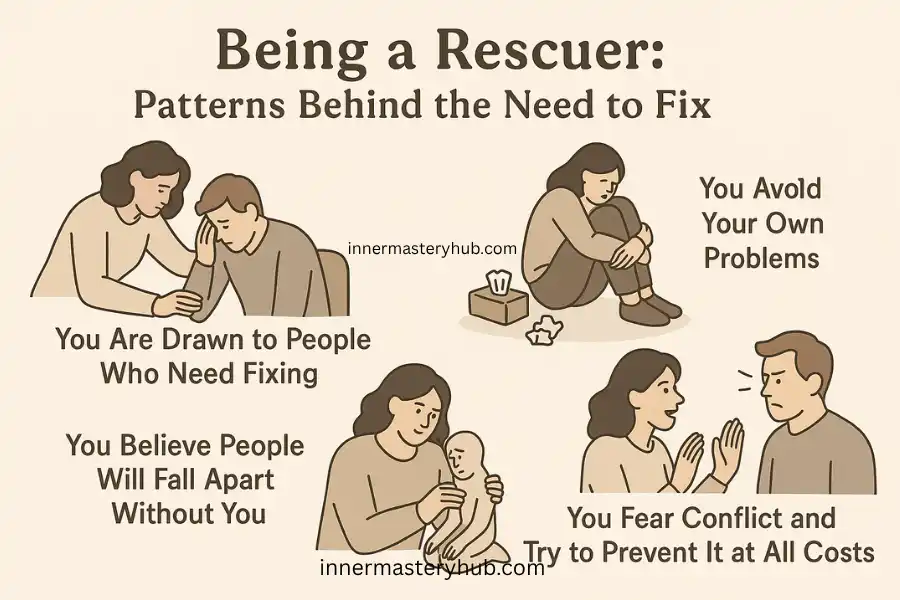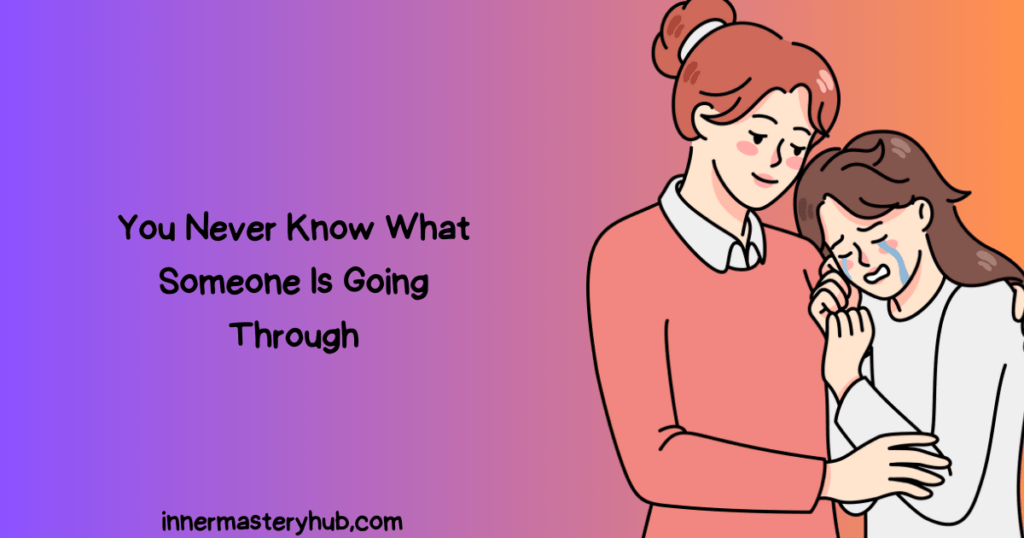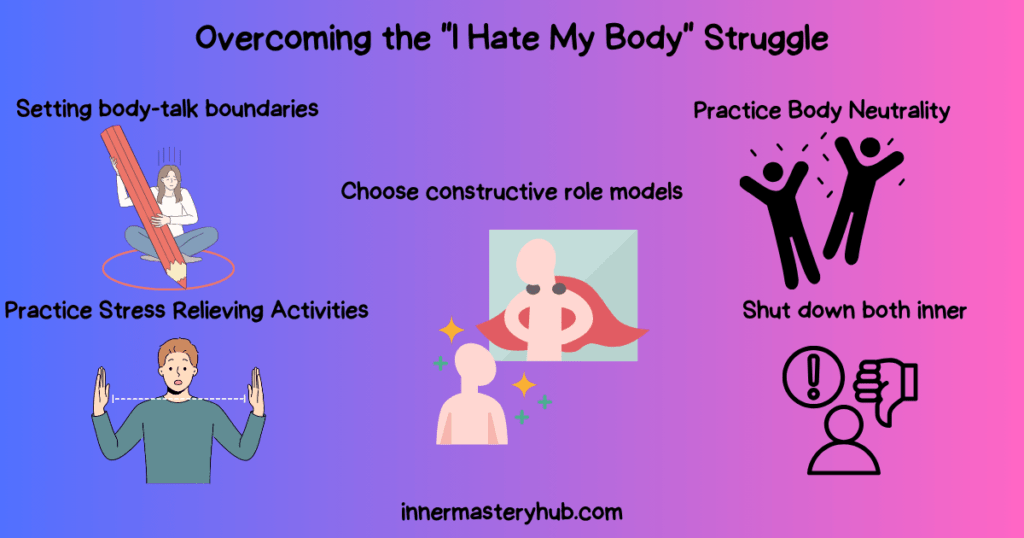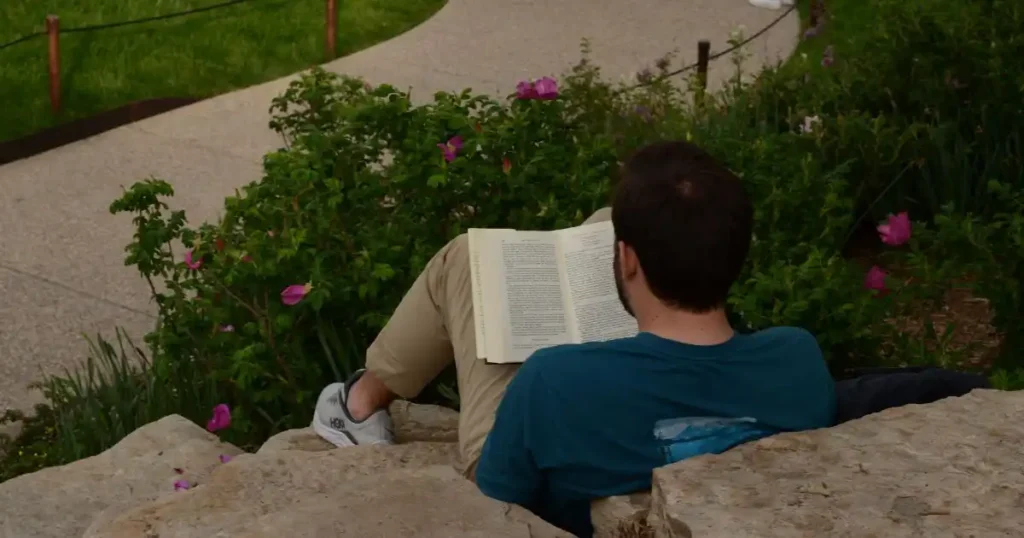Being a Rescuer: 11 Risky Patterns Behind the Need to Fix

If you take a careful look at being a rescuer, you might see that it manifests itself in many different aspects of your life involuntarily. You may volunteer to take on emotional burdens that aren’t yours, propose answers before anyone asks, or step in to ease tension. This initially appears responsible and compassionate, but the pattern eventually grows tiresome.
You feel worn out, undervalued, misinterpreted, or taken advantage of, and may wonder why you keep going through this pattern. Many people encounter this dynamic without understanding its root causes and how to establish more constructive and emotional boundaries.
1. You Learned Early That Your Worth Came From Helping
If you grew up in a home where conflict was common, you may have learned to stay alert and step in to calm the situation. Research on family dynamics shows that children often assume roles, such as the peacemaker or caretaker, to maintain a predictable environment. If the adults were overwhelmed, you might have worked hard to carry responsibilities long before you were ready.
As an adult, this turns into an automatic instinct to fix everything for everyone. You feel uncomfortable when others struggle because it reminds you of old stress you never processed. When you ask yourself where you first learned to carry burdens that weren’t yours, you start noticing patterns that were formed out of Survival, not preference. To work this out, accepting this, can help you begin separating who you became out of necessity from who you want to be now.
2. You Feel Responsible for Other People’s Emotions
Being a rescuer, you find it challenging to keep your emotional experiences apart from those of others. People who grow up in unpredictable households develop a heightened awareness of the moods around them. When someone is upset, you sense it in your body and feel obligated to make things right right away. If you fear you made someone uncomfortable, you could stress, overthink, or replay conversations. Because you are bearing burdens no one asked you to, you become emotionally exhausted.
You can gently remind yourself that discomfort is common in relationships by taking a moment to reflect on your response. You don’t need to absorb to care. You don’t have to rush to find a solution. You can listen without rushing to solve. And you can support without apologizing for things that are not yours.
3. You’re afraid of disappointing other people, so you go overboard
You may reflexively answer “yes” even when you’re overwhelmed if saying “no” seems like rejection. Many people-pleasing behaviours stem from a fear of negative judgment and a desire for acceptance, according to social psychology research.
You can think that how helpful you are defines your worth. Because your needs remain at the bottom of your list, this anxiety usually ends in burnout. You can understand the fundamental ideas that influence your decisions by considering why failing someone seems like such a significant cost. You begin to see that setting appropriate boundaries doesn’t drive people away. They help you stay grounded.
4. You Are Drawn to People Who Need Fixing
It’s not a coincidence if you constantly find yourself in friendships or relationships with people who are emotionally unavailable, suffering, or chaotic. People with anxious tendencies tend to feel most needed when the other person is unstable. You could mistake feeling loved for feeling needed. The issue is that these connections force you into a vicious cycle of giving more than you get in return.
You might continue trying to “save” the other person, hoping they will finally grant you the stability you offer. You eventually realise that the dynamic leaves you exhausted and undervalued. You can choose partnerships based on mutual respect when you consider what attracts you to those in need of rescue.
5. You Struggle to Sit With Other People’s Discomfort
As a rescuer, you often need to intervene quickly when someone is feeling anxious or depressed. Emotional strain is the source of this discomfort. Many adults suffer from stress because they were never taught how to sit with complex emotions. When you witness someone in pain, you may feel restlessness until the issue is addressed.
You remedy discomfort because it feels unsafe, not because you seek control. And try to build resilience gradually as you start to pause rather than rush in. You develop the ability to let people go through their own emotional journey without interfering. You also allow yourself to admit when you’re uncomfortable. As a result, relationships improve, and support is no longer dependent on ongoing intervention.
6. You Take Pride in Being the Strong One
As a Rescuer, you often see yourself as trustworthy, stable, and competent. These are admirable traits, but the problem arises when you feel like you have to be the strong one all the time. You may experience pressure to uphold a characteristic even when it is detrimental to you if it becomes essential to your identity. You may cover up your own difficulties, overwork yourself, or deal with circumstances in silence if you think that being strong means never requiring help.
Vulnerability seems dangerous, so you continue even though the expectation wears you out. You come to the realisation that strength does not include doing everything by yourself when you go back to the moments when you wished someone had helped you. Allowing others to support you is a sign of true strength.

7. Being a Rescuer You Avoid Your Own Problems by Fixing Other People’s
Rescuing can occasionally be a diversion. When you focus on the outside world, it can temporarily reduce anxiety by providing a sense of direction and purpose, and helping someone else can give relief if your own feelings are unclear or burdensome. It may seem more straightforward to solve their issue than to deal with your own anxieties, sadness, or uncertainty.
As time goes on, you might discover that while helping others gives you a sense of purpose, it also prevents you from taking care of your own needs. You start to develop emotional honesty when you take a moment to reflect on what you are avoiding. This change enables you to provide support without losing sight of your own recovery.
8. You Believe People Will Fall Apart Without You
You can underestimate other people’s capacity to cope if you were raised with excessive responsibility. Over-functioning and learnt helplessness in relationships, when one person repeatedly intervenes, the other person may never gain self-assurance or problem-solving abilities. You can feel bad about taking a step back because you think something negative might occur.
You can feel that your participation is the only thing keeping your life stable. This is a burdensome belief that supports connections that require ongoing work. You find that people are more capable than you anticipated when you gradually let them make their own decisions. This relieves you of the burden of being the sole one keeping things together.
9. You Feel Uncomfortable Receiving Help
Being a rescuer, you feel exposed when they receive help. According to studies on reciprocity norms, giving makes people feel comfortable, but getting makes them feel exposed. When attention turns to your needs, you could feel uncomfortable or anxious about being a burden.
You end up giving far more than you let yourself get as a result of this imbalance. This eventually results in emotional loneliness and exhaustion. You broaden your perception of what you deserve when you practise allowing people to help you, even in tiny ways. You discover that compassion is reciprocal and that when others can support your well-being, they feel more connected to you.
10. You Fear Conflict and Try to Prevent It at All Costs
Because disagreements seem dangerous, as a rescuer, you try to step in before issues get out of hand. Those who experience high levels of conflict in their early years often associate disagreement with emotional harm. You may intervene swiftly to defuse the situation or offer ideas to avoid conflict. Even with the best of intentions, it usually prevents open communication.
Instead of learning how to settle disputes on their own, others could expect you to arbitrate their problems or rely on your composure. You build trust in your relationships when you start letting disagreements develop without getting involved. You let go of the belief that you must maintain peace on your own and discover that disputes do not always result in havoc.
11. You Tie Your Identity to Being a Rescuer
Among the deepest patterns is this one. After years of problem-solving, comforting, and encouraging, you might not know who you are outside of that role. People stick to positions that offer a sense of security. If being the rescuer is central to your identity, you could worry that taking a back seat will make you appear irrelevant, self-centred, or detached.
However, the number of repairs you make does not determine your value. Beyond accountability, your identity can encompass personal development, creativity, relaxation, and genuine connection. You start creating a life that includes you and the needs of those around you when you consider your goals beyond helping others.
How You Can Shift From Being a Rescuer Pattern Without Losing Your Compassion
Giving up on saving lives is not akin to being cold. It involves creating healthier ways to help others. You might start by identifying the areas where you feel obligated, tense, or under pressure. You can see where old behaviours persist in certain situations. You make room to select support over over-function when you need to calm down instead of reacting.
You can listen without offering solutions, support without exerting control, and show concern without taking on too much. Additionally, you can make choices based on your ability rather than guilt. This gradually develops a well-rounded compassion that makes you and the people you love feel valued.
A Self-Reflection Exercise to Support Your Shift
Take a moment to ask yourself:
- What situations automatically pull me into fixing Mode?
- What emotions come up when I try to step back?
- What would support look like if I didn’t take complete responsibility?
- What small boundary can I practice this week?
The goal is not to change everything at once but to build awareness. Awareness is what gives you the power to choose instead of react.
Choosing a Healthier Path Beyond Being a Rescuer
Breaking the habit of being a rescuer does not imply a lack of compassion. Instead of always being strong, accessible, or responsible, it’s about allowing yourself to be human. You create space to develop better relationships and habits when you understand the patterns that drive your motivation to change. You learn to help people without losing yourself and to allow them to develop without taking over. Relief, equilibrium, and a more profound sense of connection with yourself and the people you care about come from this change.
FAQs About Being a Rescuer
What does being a rescuer mean?
Being a rescuer means you automatically try to fix people’s emotions, problems, or situations, often without being asked. You feel responsible for everyone’s well-being, which can lead to stress and burnout. This pattern usually comes from childhood experiences, people-pleasing tendencies, or a fear of disappointing others.
Is being a rescuer unhealthy?
Being a rescuer is unhealthy when it causes emotional exhaustion, one-sided relationships, or a loss of personal boundaries. Helping becomes stressful instead of supportive. While caring is healthy, constantly fixing others stops them from growing and prevents you from meeting your own needs.
Why do people become rescuers?
People become rescuers because of early family roles, emotional responsibility learned in childhood, or a belief that their value depends on helping others. It can also come from anxiety, low self-worth, or a deep need for approval. Over time, fixing others becomes an automatic Survival habit.
How can I stop being a rescuer?
You can stop being a rescuer by slowing down before reacting, practicing boundaries, letting people solve their own problems, and asking yourself whether you’re helping from care or fear. Building emotional tolerance and receiving help from others also weakens the habit over time.
Why do rescuers attract emotionally needy people?
Rescuers attract emotionally needy people because they offer constant support, stability, and emotional labor. People who struggle with boundaries are often drawn to someone who overgives. This creates an uneven relationship where one person fixes and the other depends heavily on them.
What is the difference between helping and rescuing?
Helping is supportive and respectful of another person’s abilities. Rescuing takes over their responsibilities, creates dependency, and drains your energy. Helping empowers, while rescuing controls. The difference is whether you’re offering support or removing the other person’s chance to solve things themselves.
Are rescuers connected to trauma?
Yes, rescuing is often linked to emotional or relational trauma. Children in chaotic or unstable homes may become caretakers early, learning to manage others’ emotions to ensure their own safety. This childhood pattern follows them into adulthood, shaping how they connect, help, and handle stress.
Can being a rescuer hurt relationships?
Yes, rescuing can strain relationships because it creates an imbalance. The rescuer feels overworked, unseen, or resentful, while the other person becomes dependent or avoids responsibility. Over time, both sides feel frustrated because the dynamic prevents healthy communication and shared effort.
What happens when a rescuer stops rescuing?
When a rescuer stops rescuing, relationships shift. Some people may become upset because they relied on your help. Others may grow and become more independent. You may feel guilty at first, but eventually you gain more energy, clarity, and emotional balance.
How do I set boundaries as a rescuer?
Start by pausing before saying yes, expressing what you can realistically offer, and allowing others to handle their own issues. Communicate limits clearly and remind yourself that boundaries protect your well-being. You can still care without taking responsibility for everything.






